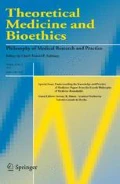Abstract
This essay explores the role of informal logicand its application in the context of currentdebates regarding evidence-based medicine. This aim is achieved through a discussion ofthe goals and objectives of evidence-basedmedicine and a review of the criticisms raisedagainst evidence-based medicine. Thecontributions to informal logic by StephenToulmin and Douglas Walton are explicated andtheir relevance for evidence-based medicine isdiscussed in relation to a common clinicalscenario: hypertension management. This essayconcludes with a discussion on the relationshipbetween clinical reasoning, rationality, andevidence. It is argued that informal logic hasthe virtue of bringing explicitness to the roleof evidence in clinical reasoning, and bringssensitivity to understanding the role ofdialogical context in the need for evidence inclinical decision making.
Similar content being viewed by others
REFERENCES
Auclair, F., J. Leroux, A. Weinberg, and J. Turnbull. “Logic in Medicine: A Need to Teach Avoidance of Fallacies.” Annals of the Royal College of Physicians and Surgeons of Canada 30 (1997): 101–102.
Barry, C.A., C.P. Bradley, N. Britten, F.A. Stevenson, and N. Barber. “Patients’ Unvoiced Agendas in General Practice Consultations: Qualitative Study.” British Medical Journal 320(7244) (2000): 1246–1250.
Britten, N., F.A. Stevenson, C.A. Barry, N. Barber, and C.P. Bradley. “Misunderstandings in Prescribing Decisions in General Practice: Qualitative Study.” British Medical Journal 320(7233) (2000): 484–488.
Centre for Evidence-Based Medicine. “Levels of Evidence and Grades of Recommendation.” http://cebm.jr2.ox.ac.uk/docs/levels.html [April 23, 2003].
Dickinson, H.D. “Evidence-Based Decision-Making: An Argumentative Approach.” International Journal of Medical Informatics 51(2–3) (1998): 71–81.
Dickinson, H.D. “Evidence-Based Medicine: A New Approach to Teaching the Practice of Medicine. Evidence-Based Medicine Working Group.” Journal of the American Medical Association 268(17) (1992): 2420–2425.
Feinstein, A.R. and R.I. Horwitz. “Problems in the ‘Evidence’ of ‘Evidence-Based Medicine’.” American Journal of Medicine 103(6) (1997): 529–535.
Gorovitz, S. and A. MacIntyre. “Toward a Theory of Medical Fallibility.” Hastings Center Report 5(6) (1975): 13–23.
Gray, J.A. “Evidence-Based Public Health: What Level of Competence Is Required?” Journal of Public Health Medicine 19(1) (1997): 65–68.
Guyatt, G.H., M.O. Meade, R.Z. Jaeschke, D.J. Cook, and R.B. Haynes. “Practitioners of Evidence Based Care: Not All Clinicians Need to Appraise Evidence from Scratch but All Need Some Skills.” British Medical Journal 320(7240) (2000): 954.
Haynes, R.B. “What Kind of Evidence Is It That Evidence-Based Medicine Advocates Want Health Care Providers and Consumers to Pay Attention To?” BioMed Central Health Services Research 2(1) (2002): 3.
Haynes, R.B., P.J. Devereaux, and G.H. Guyatt. “Physicians’ and Patients’ Choices in Evidence Based Practice.” British Medical Journal 324(7350) (2002): 1350.
Horton, R. “The Grammar of Interpretive Medicine.” Canadian Medical Association Journal 159(3) (1998): 245–249.
Leeder, S.R. and L. Rychetnik. “Ethics and Evidence-Based Medicine.” Medical Journal of Australia 175(3) (2001): 161–164.
Longino, H. Science as Social Knowledge. Princeton: Princeton University Press, 1990.
Malterud, K. “The Legitimacy of Clinical Knowledge: Towards a Medical Epistemology Embracing the Art of Medicine.” Theoretical Medicine 16(2) (1995): 183–198.
Miettinen, O.S. “Evidence in Medicine: Invited Commentary.” Canadian Medical Association Journal 158(2) (1998): 215–221.
Miles, A., P. Bentley, A. Polychronis, and J. Grey. “Evidence-Based Medicine: Why All the Fuss? This Is Why.” Journal of Evaluation in Clinical Practice 3(2) (1997): 83–86.
Miller, S. and L. Safer. “Evidence, Ethics and Social Policy Dilemmas.” Education Policy Analysis Archives 1 (1993): 1–14.
Naylor, C.D. “Grey Zones of Clinical Practice: Some Limits to Evidence-Based Medicine.” Lancet 345(8953) (1995): 840–842.
Norman, G.R. “Examining the Assumptions of Evidence-Based Medicine.” Journal of Evaluation in Clinical Practice 5(2) (1999): 139–147.
Pellegrino, E.D. “The Ethical Use of Evidence in Biomedicine.” Evaluation and the Health Professions 22(1) (1999): 33–43.
Polychronis, A., A. Miles, and P. Bentley. “The Protagonists of ‘Evidence-Based Medicine’: Arrogant, Seductive and Controversial.” Journal of Evaluation in Clinical Practice 2(1) (1996): 9–12.
Poynard, T., M. Munteanu, V. Ratziu, Y. Benhamou, V. Di Martino, J. Taieb, and P. Opolon. “Truth Survival in Clinical Research: An Evidence-Based Requiem?” Annals of Internal Medicine 136(12) (2002): 888–895.
Reid, M.C., D.A. Lane, and A.R. Feinstein. “Academic Calculations Versus Clinical Judgments: Practicing Physicians’ Use of Quantitative Measures of Test Accuracy.” American Journal of Medicine 104(4) (1998): 374–380.
Round, A. “Introduction to Clinical Reasoning.” Journal of Evaluation in Clinical Practice 7(2) (2001): 109–117.
Straus, S.E. and F.A. McAlister. “Evidence-Based Medicine: A Commentary on Common Criticisms.” Canadian Medical Association Journal 163(7) (2000): 837–841.
Tanenbaum, S.J. “What Physicians Know.” New England Journal of Medicine 329(17) (1993): 1268–1271.
Tonelli, M.R. “The Philosophical Limits of Evidence-Based Medicine.” Academic Medicine 73(12) (1998): 1234–1240.
Toulmin, S. The Uses of Argument. Cambridge: Cambridge University Press, 1958.
Upshur, R. “Certainty, Probability and Abduction: Why We Should Look to C.S. Peirce Rather than Gödel for a Theory of Clinical Reasoning.” Journal of Evaluation in Clinical Practice 3(3) (1997): 201–206.
Upshur, R. “The Ethics of Alpha: Reflections on Statistics, Evidence and Values in Medicine.” Theoretical Medicine and Bioethics 22(6) (2001): 565–576.
Upshur, R. “Priors and Prejudice.” Theoretical Medicine and Bioethics 20(4) (1999): 319–327.
Upshur, R. “Seven Characteristics of Medical Evidence.” Journal of Evaluation in Clinical Practice 6(2) (2000): 93–97.
Upshur, R.E., E.G. VanDenKerkhof, and V. Goel. “Meaning and Measurement: An Inclusive Model of Evidence in Health Care.” Journal of Evaluation in Clinical Practice 7(2) (2001): 91–96.
Walton, D. “Argumentation and Theory of Evidence.” In New Trends in Criminal Investigation and Evidence Vol. Ii, 711–732. Antwerp: Intersentia, 2000.
Walton, D. The New Dialectic: Conversational Contexts of Argument. Toronto: University of Toronto Press, 1998.
Walton, D. “What Is Reasoning? What Is an Argument?” Journal of Philosophy 87 (1990): 399–419.
Zarkovich, E. and R.E. Upshur. “The Virtues of Evidence.” Theoretical Medicine and Bioethics 23(4–5) (2002): 403–412.
Author information
Authors and Affiliations
Rights and permissions
About this article
Cite this article
Upshur, R., Colak, E. Argumentation and Evidence. Theor Med Bioeth 24, 283–299 (2003). https://doi.org/10.1023/A:1026006801902
Issue Date:
DOI: https://doi.org/10.1023/A:1026006801902




